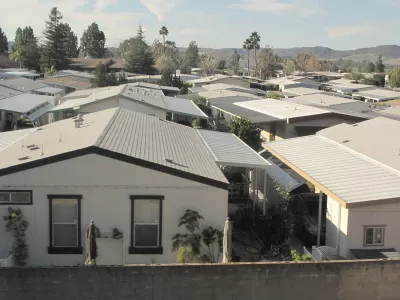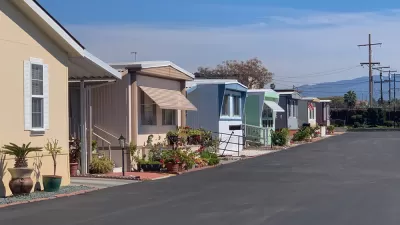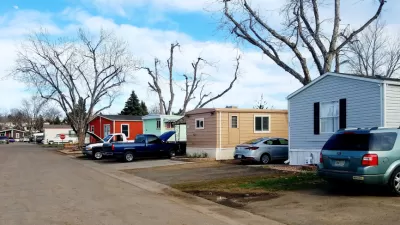To protect a valuable source of affordable housing, Seattle's city council will consider creating a 'mobile home overlay district' that would preserve housing and regulate new development.

"The Seattle City Council has passed another six month development moratorium for the city’s two remaining mobile home parks," reports Natalie Bicknell Argerious for The Urbanist, giving residents a reprieve from potential displacement before the City Council votes on new housing protection legislation next week.
As Bicknell Argerious writes, the proposal before the council would create a 'mobile home overlay district' that would limit new construction and redevelopment to mobile homes, mobile home parks, and affordable housing owned by government agencies or non-profits. The zone includes other requirements such as relocation assistance and right of first offer to current residents.
While mobile home parks may offer lower density than multi-unit buildings could, housing advocates note that single-story manufactured homes provide suitable housing for people unable to use stairs—unlike much of Seattle's non-ADA-compliant housing stock—and provide low-cost housing for around 22 million Americans. But, as the article points out, about half of the nation's 8.5 million mobile homes sit on leased land. "While mobile homes are an important source of affordable housing, they can be a risky bet for owners, especially when they do not own the land on which their property is located." Enacting legal protections for mobile home park residents, such as those being considered by Seattle, could guard against displacement and profit-driven redevelopment in one of the last bastions of affordable housing.
FULL STORY: Mobile Home Park Protections to Preserve Up to 11 Acres for Affordable Housing in Bitter Lake

Alabama: Trump Terminates Settlements for Black Communities Harmed By Raw Sewage
Trump deemed the landmark civil rights agreement “illegal DEI and environmental justice policy.”

Planetizen Federal Action Tracker
A weekly monitor of how Trump’s orders and actions are impacting planners and planning in America.

Why Should We Subsidize Public Transportation?
Many public transit agencies face financial stress due to rising costs, declining fare revenue, and declining subsidies. Transit advocates must provide a strong business case for increasing public transit funding.

Understanding Road Diets
An explainer from Momentum highlights the advantages of reducing vehicle lanes in favor of more bike, transit, and pedestrian infrastructure.

New California Law Regulates Warehouse Pollution
A new law tightens building and emissions regulations for large distribution warehouses to mitigate air pollution and traffic in surrounding communities.

Phoenix Announces Opening Date for Light Rail Extension
The South Central extension will connect South Phoenix to downtown and other major hubs starting on June 7.
Urban Design for Planners 1: Software Tools
This six-course series explores essential urban design concepts using open source software and equips planners with the tools they need to participate fully in the urban design process.
Planning for Universal Design
Learn the tools for implementing Universal Design in planning regulations.
Caltrans
Smith Gee Studio
Institute for Housing and Urban Development Studies (IHS)
City of Grandview
Harvard GSD Executive Education
Toledo-Lucas County Plan Commissions
Salt Lake City
NYU Wagner Graduate School of Public Service





























